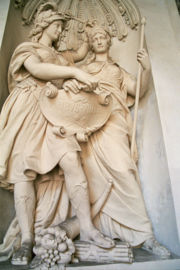- Cornucopia
-
Das Füllhorn (lat. cornu copiae, „Horn der Fülle“; gr. „κέρας Ἀμαλθείας“ keras Amaltheias, „Horn der Amaltheia“) ist ein mythologisches Symbol des Glückes. Es ist mit Blumen und Früchten gefüllt und steht für Fruchtbarkeit, Reichtum und Überfluss.
Vom Aussehen her ist das Füllhorn ein trichter- oder tütenförmig geformter Flechtkorb, der vor allem zur Weinlese Verwendung gefunden haben dürfte. In der griechischen Mythologie gehörte das Füllhorn zuerst zu der mythischen Ziege Amaltheia, die damit Zeus aufzog, wird dann aber auch von den Gottheiten der Erde Gaia, des Friedens Eirene, des Schicksals Tyche und des Reichtums Plutos verwendet.
In der Darstellung der vier Jahreszeiten wird es vor allem der Erntezeit Herbst zugeordnet. Das Füllhorn kann aber auch, wie bei der Darstellung der römischen Flora, mit dem Frühling in Verbindung gebracht werden, weicht in neuzeitlichen Darstellungen hier aber dem Blumengebinde, wie bei Giuseppe Arcimboldos Flora (Ende 16. Jh.), Rembrandts Saskia als Flora (1634) und auch noch Louis-Marin Bonnets Tête de Flore (1769) oder der Countess Kaganek (1782) von Élisabeth Vigée-Lebrun. Schon Tizians Flora (um 1515) hält jedoch nur wenige Knospen in den Händen. Von den alttestamentlichen Figuren ist es dann vor allem der Prophet Joel, der mit einem Füllhorn gezeigt wird.
Das Füllhorn ist das Zeichen für die französische Münzprägestätte Établissement Monétaire du Pessac und seit 2007 auch für die finnische Münzprägestätte Rahapaya Oy in Vantaa.
Literatur
- Karl Kerényi: Die Mythologie der Griechen - Die Götter- und Menschheitsgeschichten, dtv, München 1994. ISBN 3-423-30030-2
- Michael Grant und John Hazel: Lexikon der antiken Mythen und Gestalten. dtv, München 2004. ISBN 3-423-32508-9
- Robert von Ranke-Graves: Griechische Mythologie - Quellen und Deutung. rororo, Hamburg 2001. ISBN 3-499-55404-6
Weblinks
Wikimedia Foundation.


.png)